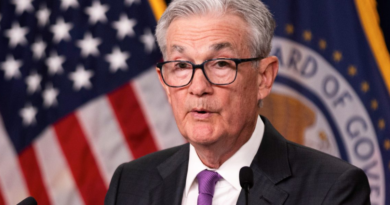Why high inflation doesn't always mean disaster for the stock market
The bad news? The stock market is going sideways. The good news? There are finally some decent alternatives to stocks, according to Ben Carlson. His new piece is included in Fortune’s finance team’s new Quarterly Investment Guide which you can read here.
Carlson argues that we’re in a new era. “Throughout much of the 2010s, the financial markets were in a TINA (there is no alternative) environment,” he writes. “The Federal Reserve held short-term interest rates near 0% for much of the decade, and bond yields were paltry compared with the previous 50 to 60 years.”
But following one of the Fed’s “most aggressive interest rate hiking cycles in history to combat the highest inflation rates in 40 years, a TINA is no longer,” Carlson writes. “There are now plenty of alternatives for investors, and they are relatively safe choices. You can now find yields in the 4% to 5% range on money-market funds, CDs, savings bonds, online savings accounts, and boring old Treasury bills.”
Carlson points out that for those in search of higher yield for their cash or more stable parts of their portfolio, this is a welcome development. However, “inflation remains elevated so the real yields aren’t nearly as juicy as the nominal levels, but I’m not sure many retirees or fixed-income investors care considering how low yields were for the past decade-plus,” he writes.
He also throws cold water on the idea that higher interest rate environments are always terrible for stocks. “This makes sense in theory,” he writes. “A higher risk-free rate should mean lower valuations, a higher hurdle rate to accept risk and lower expected returns for stocks. But financial market theory doesn’t always translate into the real world when it comes to the financial markets.”
Going back decades, Carlson looked at the average 10-year U.S. Treasury yields, the average three-month T-bill yields, and the S&P 500 annual returns. He finds that the highest average yields occurred in the 1980s, which was also one of the best decades ever for stocks.
You can read the full story here.
And check out our Quarterly Investment Guide for tips on the best money market funds and more.
Have a good weekend. See you on Monday.
Sheryl Estrada
sheryl.estrada@fortune.com
Big deal
A new report by S&P Global Market Intelligence finds that the tally of U.S. corporate bankruptcy filings with more than $1 billion in liabilities is on the rise this year. As of April 4, six companies, including the parent of the failed Silicon Valley Bank, are on the billion-dollar bankruptcy list in 2023, which is the highest year-to-date total since 2018, according to the report. As companies battle elevated interest rates and inflation, there’s growth in overall bankruptcy filings, which hit a level higher than any comparable period in the past 12 years, the researchers explain.
Going deeper
Here are a few Fortune weekend reads:
Goldman Sachs says Fed officials don’t need to spark a recession to tame inflation—but Fed officials think otherwise by Will Daniel
‘Synthetic data’ could determine whether or not millennial founder Charlie Javice lied to JPMorgan Chase about millions of fake customers by Luisa Beltran
How much money you need to make to live comfortably in America’s 10 most expensive cities by Chloe Berger
The 6 things longevity expert Dr. Mark Hyman does each day to keep his brain sharp by Alexa Mikhail
Leaderboard
Here’s a list of some notable moves this week:
Jiri Ponrt was named CFO at Groupon, Inc. (Nasdaq: GRPN), a deal-of-the-day website that offers discounted gift certificates. Ponrt will succeed Damien Schmitz, who is leaving the company after more than 10 years. Ponrt is joining Groupon from Pale Fire Capital, which is Groupon’s largest shareholder. Before that, he served as CFO at Alza.cz, one of the largest e-commerce players in Central and Eastern Europe. Ponrt also spent 15 years at Danone/Nutricia.
Linda LaGorga was named CFO at Entegris, Inc. (Nasdaq: ENTG), a supplier of materials and process solutions for the semiconductor industry, effective May 15. LaGorga succeeds Greg Graves, who recently announced his retirement. LaGorga joins Entegris from Honeywell International Inc., where she most recently served as VP and CFO of Honeywell’s $2.4 billion UOP business unit. Previously, she served as VP and CFO of the Honeywell aerospace mechanical systems and components business.
Gina Goetter will step down as CFO at Harley-Davidson, Inc. (NYSE: HOG) at the end of April. Goetter will become CFO at Hasbro, Inc. (Nasdaq: HAS), effective May 18. Before her time at Harley-Davidson, Goetter was SVP of finance for Tyson Foods’ Prepared Foods Segment and also spent 21 years at General Mills in several increasingly senior finance roles. Harley-Davidson has initiated a formal search process for a new CFO. David Viney, VP and treasurer, will serve as interim CFO, effective April 28.
John Stern will be promoted to senior executive vice president and head of finance at U.S. Bank (owned by U.S. Bancorp NYSE: USB) in May and is expected to become CFO on Sept. 1. Terry Dolan, 61, who has served as the company’s CFO since 2016, is expected to take on a broader role as vice chair and chief administration officer, succeeding Kate Quinn, 58, who will be retiring from her position on June 30. Stern is currently the president of the company’s global corporate trust and custody business.
Joe Lillo was promoted to CFO at Pilot Company, a supplier of fuel and operator of travel centers in North America, effective May 30. After Berkshire Hathaway (NYSE: BRK.B) became the majority owner of Pilot Company on Jan. 31, it identified Lillo for the CFO role. He has been part of the Berkshire Hathaway Energy family of businesses for more than 25 years.
William J. Keneally was named interim CFO at RiceBran Technologies (Nasdaq: RIBT), a manufacturer of ingredients derived from rice and ancient grains, effective April 17. Keneally succeeds Todd Mitchell. Keneally is a public company finance executive and a partner at CXO Partners, a new services firm of TechCXO. He previously served as chief accounting officer of Flutterwave, Inc.
Chris Murray was named CFO at Brightside Health, a telehealth platform that delivers mental health care. Murray brings over 15 years of experience in roles across finance, operations, and go-to-market functions at health care and technology companies. He joins Brightside Health from Evolent Health, where he served as VP of finance.
Overheard
“We’re not over bank failures, but depositors haven’t had a crisis. Banks go bust. But depositors aren’t going to be hurt.”
—Investing legend Warren Buffett, chairman and CEO of Berkshire Hathaway, predicted on CNBC’s Squawk Box on Wednesday that there will be more bank failures, but depositors shouldn’t be worried.
This is the web version of CFO Daily, a newsletter on the trends and individuals shaping corporate finance. Sign up to get CFO Daily delivered free to your inbox.



